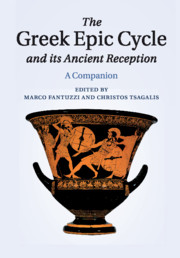Book contents
- Frontmatter
- Contents
- List of illustrations
- List of contributors
- Editorial note
- Introduction: Kyklos, the Epic Cycle and Cyclic poetry
- PART I APPROACHES TO THE EPIC CYCLE
- PART II EPICS
- PART III THE FORTUNE OF THE EPIC CYCLE IN THE ANCIENT WORLD
- 22 The aesthetics of sequentiality and its discontents
- 23 The Epic Cycle, Stesichorus, and Ibycus
- 24 Pindar's Cycle
- 25 Tragedy and the Epic Cycle
- 26 The Hellenistic reception of the Epic Cycle
- 27 Running rings round Troy: Recycling the ‘Epic Circle’ in Hellenistic and Roman art
- 28 Virgil and the Epic Cycle
- 29 Ovid and the Epic Cycle
- 30 Statius' Achilleid and the Cypria
- 31 The Epic Cycle and the ancient novel
- 32 The Epic Cycle and imperial Greek epic
- Works cited
- Index of principal passages
- Index nominum et rerum
31 - The Epic Cycle and the ancient novel
from PART III - THE FORTUNE OF THE EPIC CYCLE IN THE ANCIENT WORLD
Published online by Cambridge University Press: 05 August 2015
- Frontmatter
- Contents
- List of illustrations
- List of contributors
- Editorial note
- Introduction: Kyklos, the Epic Cycle and Cyclic poetry
- PART I APPROACHES TO THE EPIC CYCLE
- PART II EPICS
- PART III THE FORTUNE OF THE EPIC CYCLE IN THE ANCIENT WORLD
- 22 The aesthetics of sequentiality and its discontents
- 23 The Epic Cycle, Stesichorus, and Ibycus
- 24 Pindar's Cycle
- 25 Tragedy and the Epic Cycle
- 26 The Hellenistic reception of the Epic Cycle
- 27 Running rings round Troy: Recycling the ‘Epic Circle’ in Hellenistic and Roman art
- 28 Virgil and the Epic Cycle
- 29 Ovid and the Epic Cycle
- 30 Statius' Achilleid and the Cypria
- 31 The Epic Cycle and the ancient novel
- 32 The Epic Cycle and imperial Greek epic
- Works cited
- Index of principal passages
- Index nominum et rerum
Summary
The ‘ancient novel’ is a diffuse phenomenon, comprising a core of clearly fictional texts generally acknowledged (by classicists, at least) as meeting the criteria for designation as ‘novels’, and a ‘fringe’ of prose texts that flirt with fictionality to varying degrees. If, for the purposes of this brief discussion, we restrict our gaze to the seven extant texts typically assigned to the core – the five Greek romances (Chariton's Chaereas and Callirhoe, Xenophon's Ephesiaca, Achilles Tatius’ Leucippe and Cleitophon, Longus’ Daphnis and Chloe, Heliodorus’ Aethiopica) and the two ‘comic’ novels in Latin (Petronius’ Satyrica, Apuleius’ Metamorphoses) – we will find that, in spite of certain promising convergences, it is not easy to identify direct connections between the Epic Cycle and this corpus. Obvious references to the content of the Cycle are relatively infrequent, while arguably the most prominent display of Cyclic themes in the novels, the ‘Iliou persis’ recited by Petronius’ Eumolpus, is, first and foremost, a parodic reworking of Roman texts (Virgil and Seneca), and only residually (if at all) an evocation of Greek models. The difficulty, to be sure, is compounded by the very fragmentary state of our evidence for the Cycle itself, which makes it virtually impossible to say whether any given reference to the stories reported in the Cycle is intended as an allusion to a specific Cyclic text, or instead draws merely on general knowledge of heroic legend. All the same, the Cycle makes a disappointing showing in the extant novels – especially considering the many good reasons for supposing that traces of its influence might be there to be found.
There is, first of all, the suggestive chronological proximity of literary trends. The mid to late first century AD is a period that sees not only the birth of the Greek romance (so far as we can tell), but also a renewed interest in the penumbra of Trojan legends surrounding the Homeric poems. Much uncertainty surrounds the dating of the novels, but there is now broad consensus that Chaereas and Callirhoe, the earliest of the extant Greek texts, should be placed roughly around AD 50, and there is a strong likelihood that the earliest fragmentary romances (the so-called Ninus and Metiochus and Parthenope) were composed in the decades immediately thereafter.
- Type
- Chapter
- Information
- The Greek Epic Cycle and its Ancient ReceptionA Companion, pp. 596 - 603Publisher: Cambridge University PressPrint publication year: 2015
- 1
- Cited by



